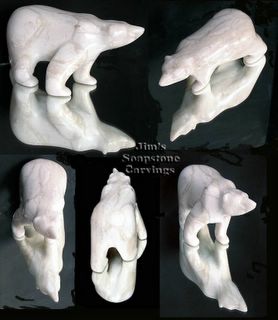Monday, December 20, 2004
Inuit Climate rights
Canadian-led global Inuit group seeks link between rights and climate change
BOB WEBER
(CP) - A Canadian-led international Inuit group is beginning legal procedures to convince a major international organization that global warming violates their human rights.
"The destruction of Inuit hunting culture through climate change caused by emission of greenhouse gases is a violation of the human rights of Inuit," said Sheila Watt-Cloutier, president of the Inuit Circumpolar Conference. "This is rather new to the international world, but I think we're breaking new ground here."
Speaking from Buenos Aires, Argentina, where she was to address a UN-sponsored conference on climate change Friday, Watt-Cloutier said her group will ask an arm of the Organization of American States to rule on the issue.
The Inter-American Commission on Human Rights has no enforcement power. But a ruling in favour of the Inuit could bolster their case - especially against countries such as the United States, which have signed on to the Organization of American States but have been reluctant to take action against climate change.
"Because they signed on, they have assumed certain obligations they must uphold, and the commission and international law have shown that those obligations translate into respect for human rights," said Paul Crowley, lawyer for the Inuit group, which represents 155,000 Inuit around the world.
"We're looking at what may be a small jump, but a jump that is ready to be made, in terms of environmental security and international law and international human rights."
Crowley said a positive ruling from the commission, which has been in existence since 1948, would give the Inuit a greater presence and voice at international conferences.
"It is a well-respected commission that does make decisions that enter into the body of international law," he said.
"You win in terms of credibility into global negotiations such as those that are happening here."
Crowley noted that out of the two weeks of discussion at the current UN Framework Convention on Climate Change, only a few three-minute blocks were given to aboriginal groups to explain how they are being affected by global warming. The Inuit Circumpolar Conference was given one of those blocks.
The petition to the Inter-American Commission will take a while to complete, Crowley said. Interviews in Inuit communities will be conducted this winter and the document could be ready by the spring.
Watt-Cloutier, a Canadian who lives in Iqaluit, said studies suggest the Inuit way of life could be wiped out by global warming.
"Here we are, Inuit of the world who have lived in harmony with our surroundings, and we're being bombarded by toxins," she said.
"Now our climate and our environment is being impacted. What recourse do we have to tell the world to stop?"
© The Canadian Press, 2004

BOB WEBER
(CP) - A Canadian-led international Inuit group is beginning legal procedures to convince a major international organization that global warming violates their human rights.
"The destruction of Inuit hunting culture through climate change caused by emission of greenhouse gases is a violation of the human rights of Inuit," said Sheila Watt-Cloutier, president of the Inuit Circumpolar Conference. "This is rather new to the international world, but I think we're breaking new ground here."
Speaking from Buenos Aires, Argentina, where she was to address a UN-sponsored conference on climate change Friday, Watt-Cloutier said her group will ask an arm of the Organization of American States to rule on the issue.
The Inter-American Commission on Human Rights has no enforcement power. But a ruling in favour of the Inuit could bolster their case - especially against countries such as the United States, which have signed on to the Organization of American States but have been reluctant to take action against climate change.
"Because they signed on, they have assumed certain obligations they must uphold, and the commission and international law have shown that those obligations translate into respect for human rights," said Paul Crowley, lawyer for the Inuit group, which represents 155,000 Inuit around the world.
"We're looking at what may be a small jump, but a jump that is ready to be made, in terms of environmental security and international law and international human rights."
Crowley said a positive ruling from the commission, which has been in existence since 1948, would give the Inuit a greater presence and voice at international conferences.
"It is a well-respected commission that does make decisions that enter into the body of international law," he said.
"You win in terms of credibility into global negotiations such as those that are happening here."
Crowley noted that out of the two weeks of discussion at the current UN Framework Convention on Climate Change, only a few three-minute blocks were given to aboriginal groups to explain how they are being affected by global warming. The Inuit Circumpolar Conference was given one of those blocks.
The petition to the Inter-American Commission will take a while to complete, Crowley said. Interviews in Inuit communities will be conducted this winter and the document could be ready by the spring.
Watt-Cloutier, a Canadian who lives in Iqaluit, said studies suggest the Inuit way of life could be wiped out by global warming.
"Here we are, Inuit of the world who have lived in harmony with our surroundings, and we're being bombarded by toxins," she said.
"Now our climate and our environment is being impacted. What recourse do we have to tell the world to stop?"
© The Canadian Press, 2004
